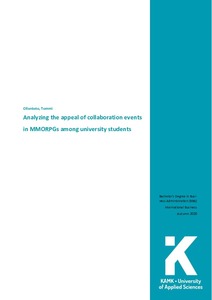Analyzing the appeal of collaboration events in MMORPGs among university students
Ollanketo, Tommi (2020)
Ollanketo, Tommi
2020
All rights reserved. This publication is copyrighted. You may download, display and print it for Your own personal use. Commercial use is prohibited.
Julkaisun pysyvä osoite on
https://urn.fi/URN:NBN:fi:amk-2020121127657
https://urn.fi/URN:NBN:fi:amk-2020121127657
Tiivistelmä
The thesis aimed to determine if collaboration events are effective in attracting university students into playing Massively Multiplayer Online Role-Playing Games (MMORPGs). The thesis has no commissioner. This topic was chosen due to the researcher’s personal interest and familiarity with the subject.
The literature background section introduces important terms and contains examples of collaboration events to familiarize the reader with the topic. Three reasons for participating in a collaboration event are also proposed in the form of hypotheses.
The research section defines the research method used and forms conclusions from the data gathered. The research data was collected through a quantitative data collection method, that being a questionnaire. Students of KAMK were provided with a questionnaire through email consisting of nine (9) different questions related to the topic. The questionnaire had a total of 82 respondents. As the data was gathered only from the students of KAMK, the researcher recommends that it should not be applied to generalize students from all universities in Finland without further research.
The research found out that approximately one in three active MMORPG players among the students of KAMK have participated in a collaboration event. Collaboration events are effective in attracting a player if they have previously participated in one. When aiming to reach university students, collaboration events should focus on having familiar brands and providing content that is both entertaining and rewarding, while being exclusively available in the event.
The literature background section introduces important terms and contains examples of collaboration events to familiarize the reader with the topic. Three reasons for participating in a collaboration event are also proposed in the form of hypotheses.
The research section defines the research method used and forms conclusions from the data gathered. The research data was collected through a quantitative data collection method, that being a questionnaire. Students of KAMK were provided with a questionnaire through email consisting of nine (9) different questions related to the topic. The questionnaire had a total of 82 respondents. As the data was gathered only from the students of KAMK, the researcher recommends that it should not be applied to generalize students from all universities in Finland without further research.
The research found out that approximately one in three active MMORPG players among the students of KAMK have participated in a collaboration event. Collaboration events are effective in attracting a player if they have previously participated in one. When aiming to reach university students, collaboration events should focus on having familiar brands and providing content that is both entertaining and rewarding, while being exclusively available in the event.
